Our History
125 years of educational leadership
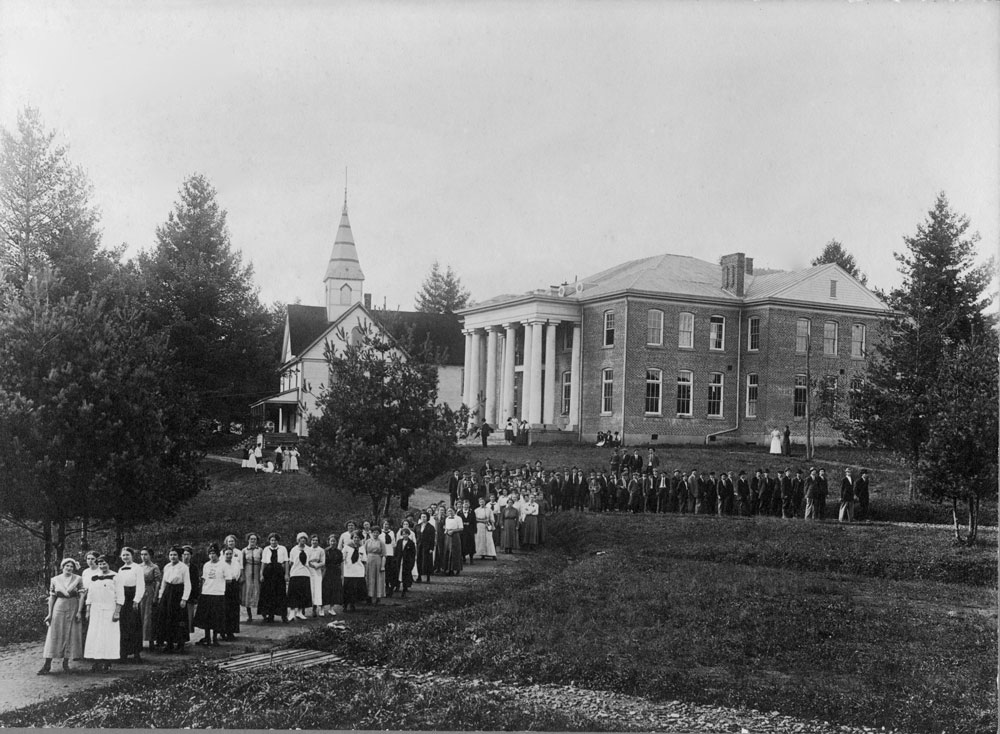
Our History
125 years of educational leadership
Appalachian State University has been committed to educational access and excellence since 1899.
Appalachian State University celebrated 125 years of educational leadership in 2024. Founded in 1899 as Watauga Academy, App State has developed into a premier public institution — one that honors our founding commitment to educational access and excellence and our rural mountain heritage through teaching, research and service. Brothers Blanford Barnard “B.B.” Dougherty and Dauphin Disco “D.D.” Dougherty, along with D.D.’s wife, Lillie Shull Dougherty, established Watauga Academy with a goal of providing access to education for those in the isolated and rural “Lost Provinces” of Western North Carolina. Their vision continues to thrive more than a century later, with generations of Mountaineers across the state, nation and world standing as testament to the power of education to change both lives and communities.
What started as a small rural academy quickly evolved into the Appalachian Training School (1903), then the Appalachian State Normal School (1925), and later the Appalachian State Teachers College (1929). In 1967, we became the comprehensive, four-year university we are today, and the university became part of the University of North Carolina System in 1971. Our more than 150 undergraduate and 80 graduate programs prepare students for leadership roles across various fields, from business and education, to health, social and natural sciences, fine and applied arts, music, and technology. The university continues to innovate new degree programs that are aligned with the workforce development needs of the state’s industries and prepare students to excel in their future careers.
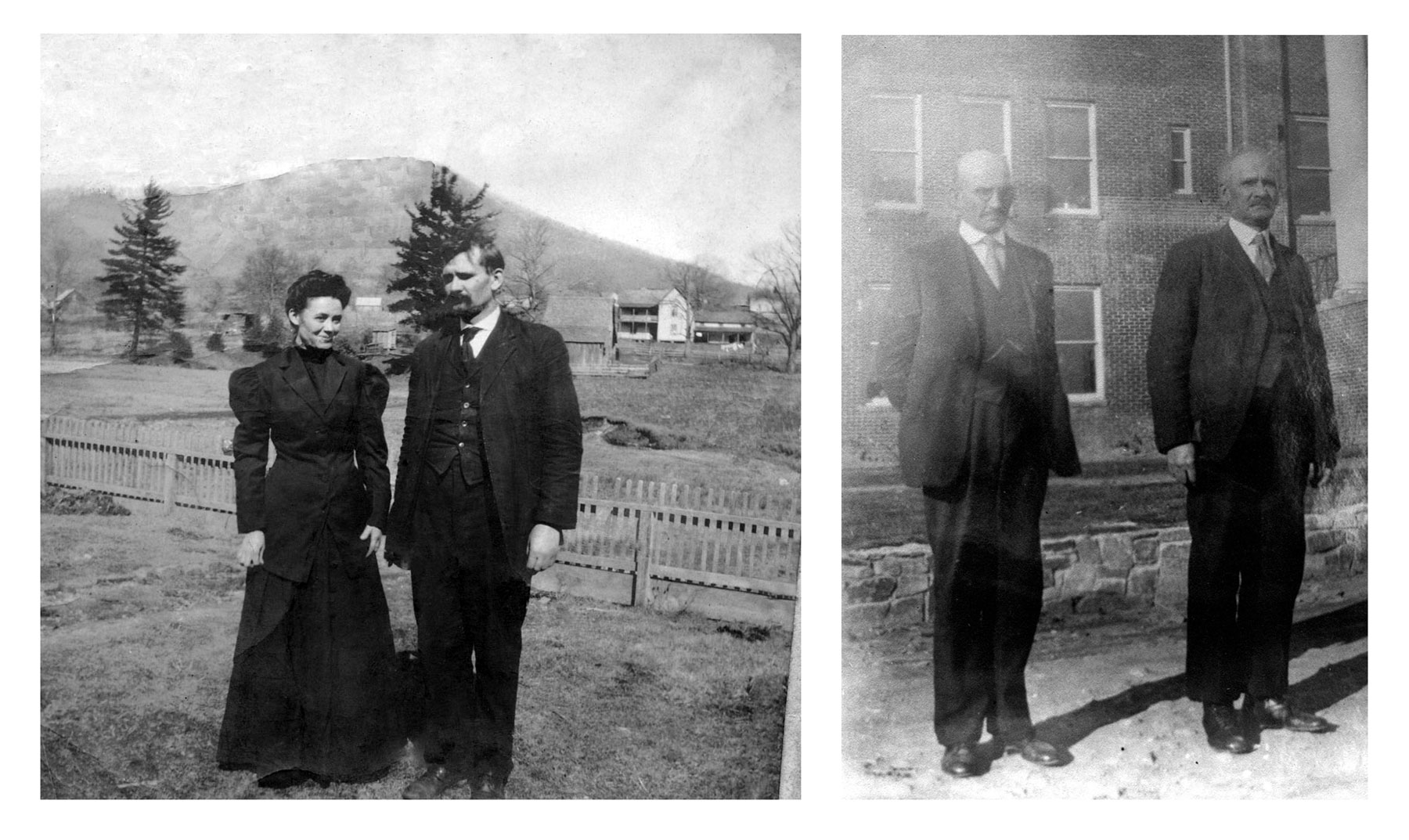
The opening of our second campus, the App State Hickory campus, in fall 2023 marked a new chapter in our mission to increase access to higher education. Prior to the campus’s establishment, the Greater Hickory area was the largest metropolitan area in the state without a public university campus. App State has also partnered with ed tech nonprofit Project Kitty Hawk to offer streamlined App State Online degree programs designed for nontraditional learners — part of a statewide effort to expand higher education access to millions of working adults in North Carolina.
Since becoming a four-year university, App State has earned regional and national recognition for its quality academics, innovative teaching, support for military-affiliated students and transfer students, programs to enhance the first-year experience and other aspects, lauded by such publications as U.S. News & World Report, The Princeton Review, Forbes magazine and The Wall Street Journal. Meanwhile, App State Athletics programs have reached new heights, with our App State Mountaineers football team capturing national attention through stunning victories in the Southern and Sun Belt conferences and our student-athletes maintaining academic excellence, having earned a cumulative GPA above 3.0 for 13 consecutive years.
Explore this timeline to learn about Mountaineer milestones, unforgettable events and interesting facts in App State’s history — from 1899 to today. When did football become an official sport at App State? Who was the university’s first leader? Dive in to find out.
The Appalachian State University of today would not have been possible without the efforts and dedication of both Mountaineers and local community members. It took funding and supplies donated by Boone community members to complete the build of the institution’s first facility, Watauga Academy, and the resilience of both university members and townspeople to see our shared community through challenging times, including the Spanish flu, both World Wars, the global COVD-19 pandemic, and, most recently, Hurricane Helene. Over the years, countless App State faculty and staff have committed their time, expertise and efforts to elevating our students’ App State Experience through innovative, interdisciplinary and integrative teaching, research and student mentorship, as well as day in and day out work that ensures the university operates efficiently and effectively year-round. And Mountaineer alumni go on to earn advanced degrees, approach life entrepreneurially, build distinguished military careers, work overseas and engage in professions that take them in many directions, all while giving back to the communities in which they live and work — strengthening our state’s economy and enhancing the quality of life for North Carolinians.
A bright future lies ahead for App State, one in which Mountaineers, working with our local and regional communities, find new mountains of opportunity by embracing challenges, innovating solutions and adapting to meet the ever-changing needs of our state, nation and world. Here’s to another 125 years of App State excellence.
Go on a visual journey of App State’s history by browsing this curated collection of snapshots. The memorable moments, time-honored traditions and Mountaineer faces offer a glimpse into the university’s past and present.














































Explore this timeline to learn about Mountaineer milestones, unforgettable events and interesting facts in App State’s history — from 1899 to today. When did football become an official sport at App State? Who was the university’s first leader? Dive in to find out.
Appalachian State University begins as Watauga Academy, founded in 1899 by Dr. Blanford Barnard “B.B.” Dougherty, his brother, Dauphin Disco “D.D.” Dougherty, and D.D.’s wife, Lillie Shull Dougherty.
An announcement of Watauga Academy’s founding appeared in the July 13, 1899, issue of the Watauga Democrat newspaper, with classes to begin Sept. 5, 1899. Tuition was $1–$3 per month, and board was $4 per month.
Local community members raised $1,100, as well as labor and materials for the two-story, wood frame Watauga Academy building, construction for which began in fall 1899. Classes for the 53 enrolled students were held in the old Boone Academy building, located behind the present-day Boone First Baptist Church, until the Watauga Academy facility was ready for classes in January 1900. Construction of Watauga Academy was completed in 1903.
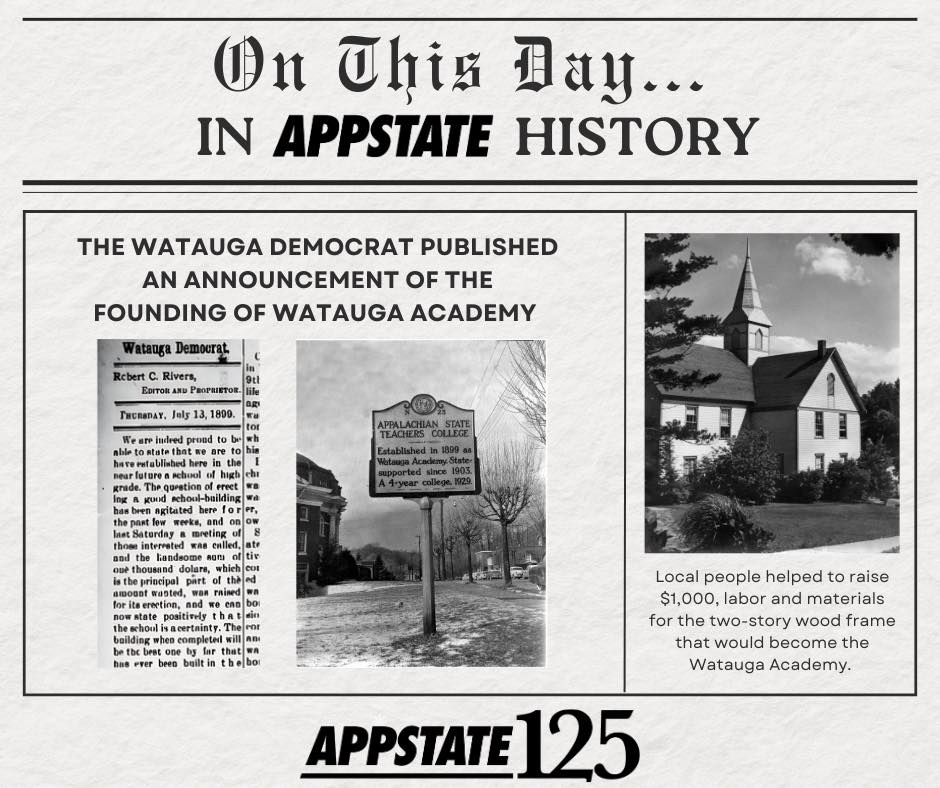
150 students enrolled at Watauga Academy.
Watauga Academy celebrates its first graduates: Thomas C. Baird, a farmer from Valle Crucis; and Jesse L. Moore, a merchant from Elizabethton, TN.
Watauga Academy became the Appalachian Training School, opening on Oct. 5, 1903, with 325 students and six faculty. The school, which prepared and trained both teachers and students, had three departments: The Public School Department with seven grades; a Teacher’s Course for teacher preparation; and a High School Department. Eight students graduated from Appalachian Training School in 1903, and deans were established the same year.
The school was made possible through $2,000 in state funding — supported by the Newland Bill, drafted by B.B. and passed by one vote on March 9, 1903, at the state legislature — as well as $1,500 in matching funds raised by Watauga County and a $500 gift from local entrepreneur Moses Cone.
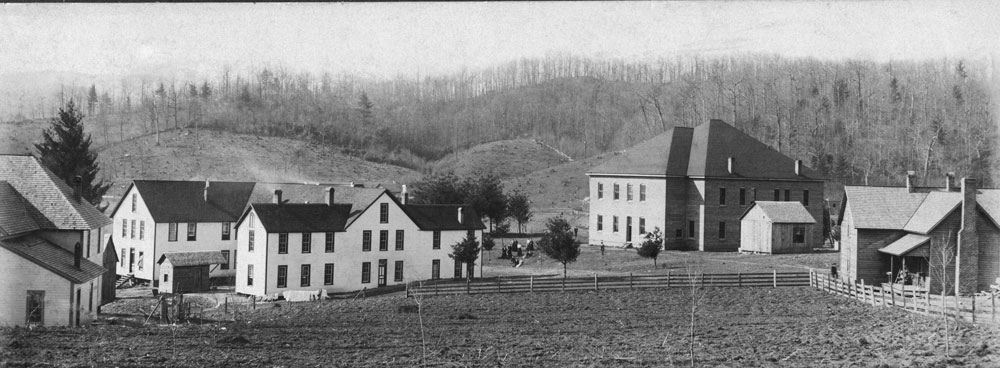
Construction of the Doughertys’ family home, located along Rivers Street on the Boone campus, is completed.
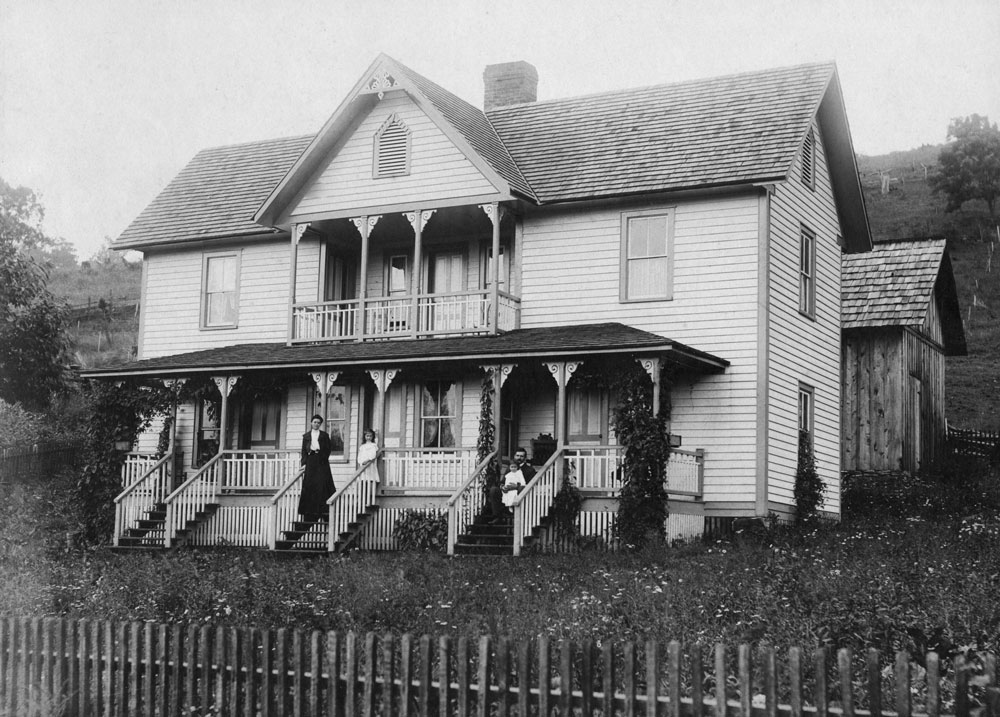
The Dew Drop — a school bulletin, course catalog and general information pamphlet — is first published. It was published from 1904 to 1930, at which point the name was discontinued but production continued as a standard course catalog. View digitized versions of the catalog.
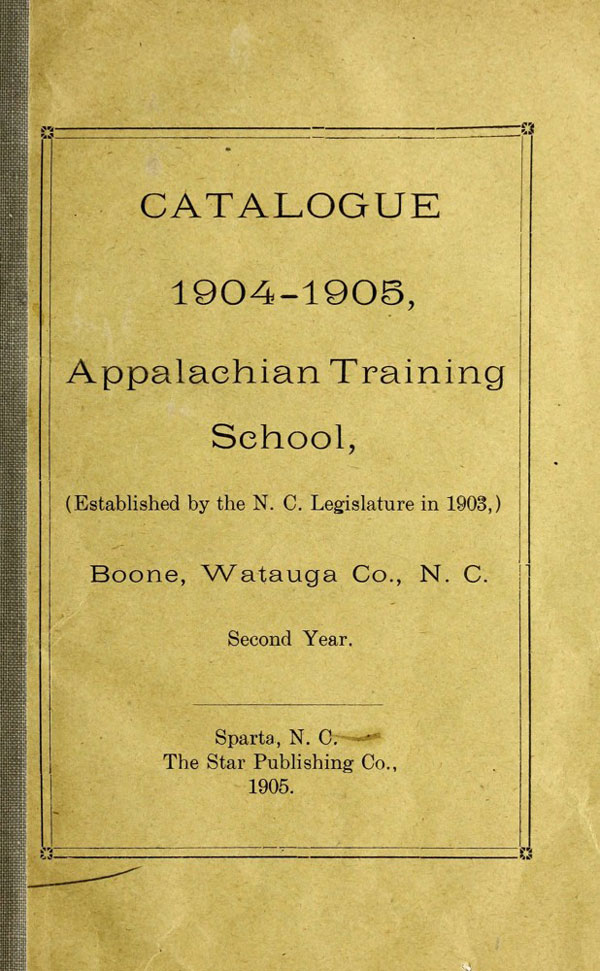
Tuition ranged from $4.50 to $11.25 per term, with free tuition for all teachers and students intending to teach a minimum two years in NC public schools. High School classes were $2.50 per month, the first three Public School grades were $1 a month, grades 4–5 were $1.50 and grades 5–6 were $2. Music and art cost $2, while piano classes were $0.25 per month.
The first administration/classroom building is completed east of Watauga Academy. The two-story building, demolished 1967, contained an office, business room and chapel on the first floor and an auditorium and music rooms on the second floor.
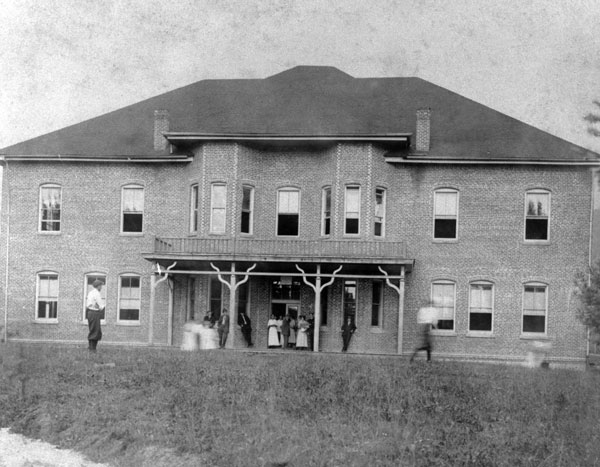
The Lovill Home was built as a women’s dormitory. It housed 85 women and included two society halls, two sitting rooms and two study rooms. Another Lovill Home was built in 1915, and the original Lovill Home became apartments for workers and teachers.
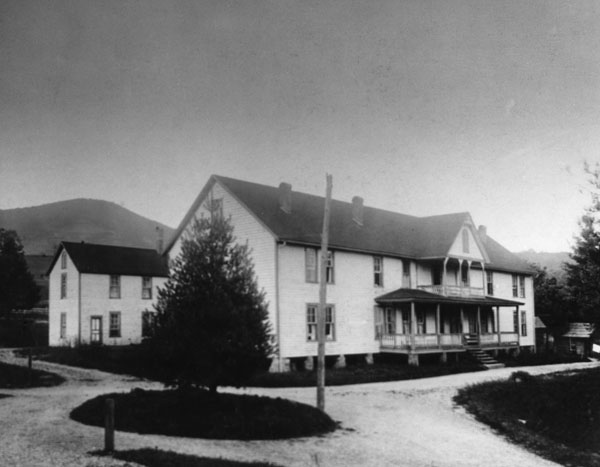
An Alumni Association is organized. Today, App State has more than 150,000 living alumni across the state, nation and world.

The first male residence, Newland Hall, is built on the south side of the Boone campus, west of the Doughertys’ home.
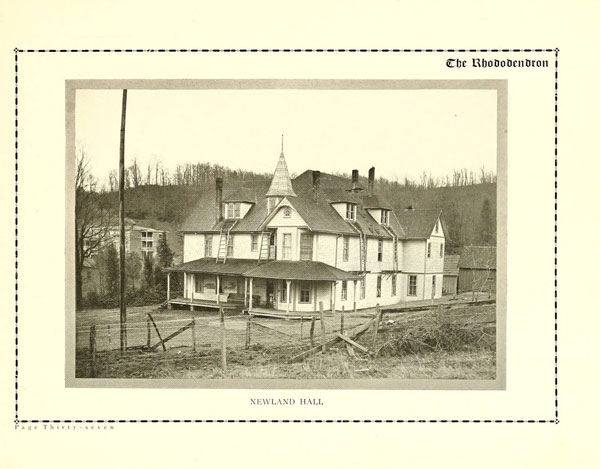
Tuition is $10 for all students. Total student fees per term (board, tuition and incremental fees) was reported as $48.50 for men and $44.00 for women. Teachers and students intending to teach in NC public schools were still exempt from tuition payments. Two scholarships for free tuition were available from the University of North Carolina and Trinity College.
371 students are taught at Appalachian Training School in the 1909–10 school year, with 108 in the summer term only.
Science Hall, the first specialized academic campus building, is completed. The building, along with Watauga Academy, was destroyed by fire in 1946.
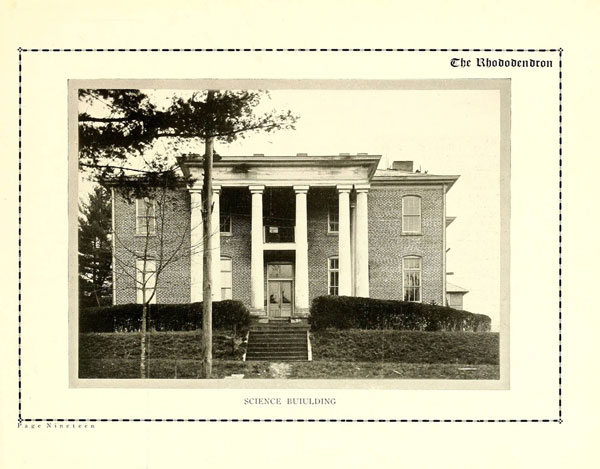
Young women students gain access to grounds for croquet, tennis and other games, located behind the Administration Building.
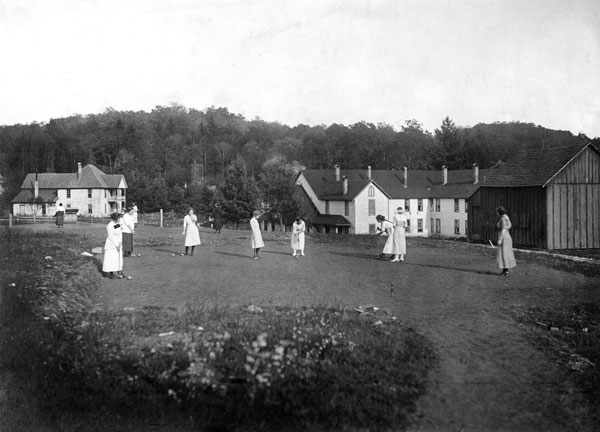
The Athletic Association, for men’s athletics, is first mentioned in the Dew Drop catalog. Membership was $0.25 per year. The association managed baseball games, a track team and other sports.
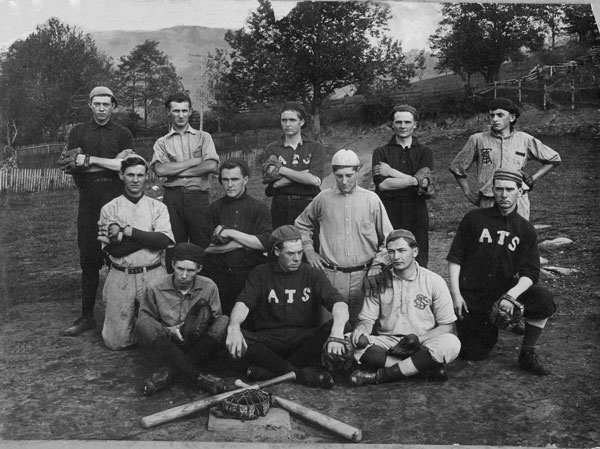
The quarter term system began. With this system, the university’s academic year operated on a four-part schedule, with fall, winter, spring and summer terms. Today, App State uses a semester system, with the academic year divided into two semesters, fall and summer, and two Summer Sessions.
Library hours are increased to two hours a day, with the library offering 5,000 volumes, two daily papers, and 20 monthly magazines. Bettie Stephenson became the university’s first librarian.
The Book Room provides students with textbooks at wholesale prices. The campus no longer provided books directly.
New River Light and Power (NRLP) — the university’s electric utility — is established with state approval. The utility’s power plant was built on Edmisten Farm, approximately two miles south of campus, and provided electricity for the first time to the Appalachian Training School and six customers in Boone. Electricity and water systems were installed in all campus buildings. Learn more about NRLP’s history.
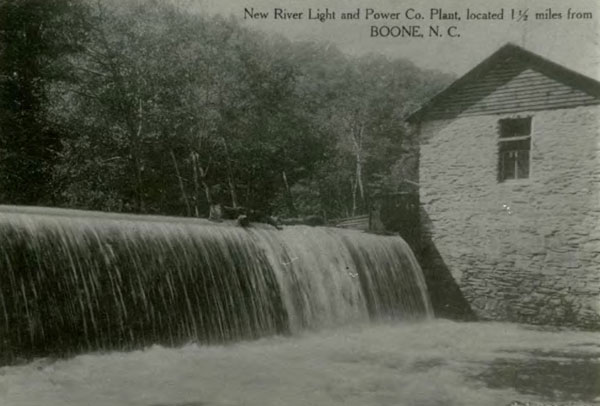
Appalachian Training School maintains 16 regular faculty and six assistants. Enrollment reaches 556.
The U.S. enters World War I and enrollment drops to 390 in the 1917–18 school year, with 181 students in summer school only.
An Arts and Crafts Building, also known as the Industrial Arts Building, is constructed on the south end of the Boone campus. The building housed the university’s first gymnasium on its first floor and the manual training program on the second floor. The facility was demolished in the late 1930s.
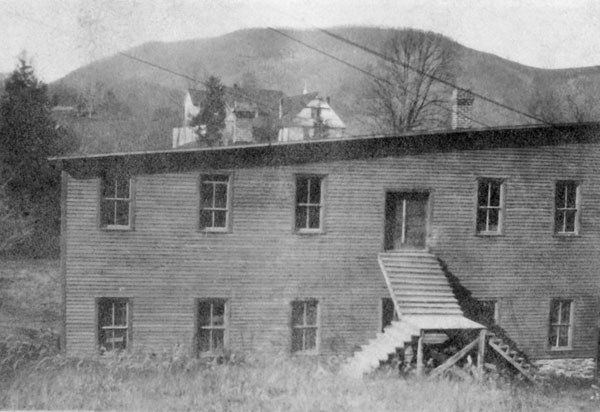
A narrow gauge railroad to Boone, NC, is established by the Linville Branch of the Eastern Tennessee and Western North Carolina Railroad, known as the Tweetsie Railroad, in October. It ran from Johnson City, TN, to Boone.
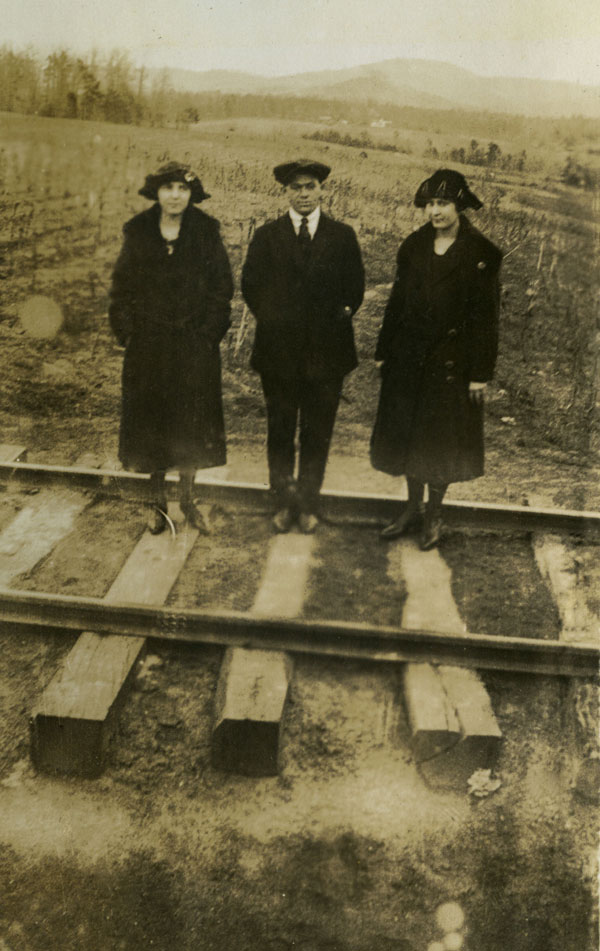
The Appalachian Training School campus is placed under quarantine during the Spanish Influenza, and students are restricted to campus, with entrances closed to visitors. A few mild cases of sickness among students were reported, but all recovered within a few days.
On Nov. 11, word arrives that World War I has ended. The Appalachian Training School celebrates, with chapel service and a parade.
The North Carolina General Assembly suggests the Appalachian Training School abandon high school education in preference for training elementary school teachers, due to a teacher shortage in the state following World War I.
University trustees elect B.B. Dougherty as sole president of Appalachian Training School and D.D. Dougherty as the school’s business manager.

The North Carolina State Board of Education takes regulatory control of Appalachian Training School, and the school begins phasing out its high school courses and implementing a two-year curriculum.
For the first time, health certificates are required at time of registration, certifying and stating that the applicant is not sick with a contagious disease and has not been exposed to any such disease within 20 days.
The first volume of the university’s yearbook, The Rhododendron, is published. It was released yearly until 1992. In 2004, the yearbook returned, but in 2006, production ended again. The Rhododendron was compiled and published by members of the senior class. View digitized issues of The Rhododendron.

Student enrollment reaches 770 in the 1922-23 school year, and 48 students graduate.
The New River Light and Power (NRLP) plant burns down on March 23, causing a blackout on campus and in Boone that lasts for 17 months. Electricity was restored in the fall of 1924, when the new hydroelectric plant on the Middle Fork of the New River was finished.

The State Board of Education appropriates $125,000 ($2.3 million in today’s dollars) for the construction of a new Administration Building on the western side of the Boone campus, as well as $300,000 (equivalent of $5.6 million today) appropriated for a hydro-electric plant on Middle Fork of the New River and a physical education building.
The university’s first football field is built. It was located on the site that is now home to the Rankin Science Building.
1,097 students enrolled at the Appalachian Training School.
The road between Wilkesboro and Boone is paved to facilitate automobile travel through the area.
The second Administration Building is completed. It was located on the Promenade, approximately where Anne Belk Hall is currently located, and was destroyed by fire in 1966.
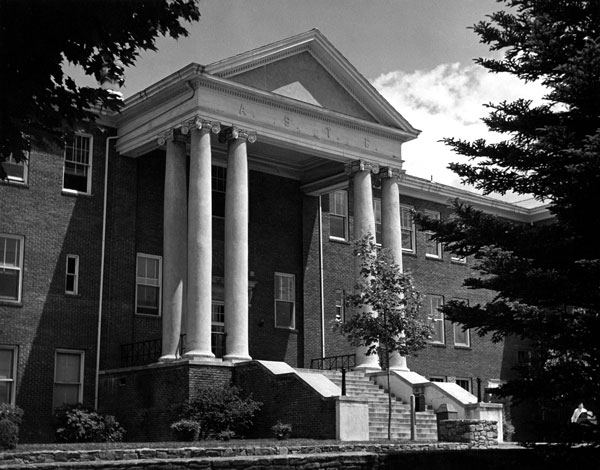
Appalachian Training School receives approval from the North Carolina General Assembly to offer two-year college courses, and the school’s name is changed to Appalachian State Normal School (ASNS). High school courses were phased out entirely. B.B. Dougherty was named president of ASNS and a new Board of Trustees was formed. ASNS opened on Oct. 5 with 350 enrolled students.
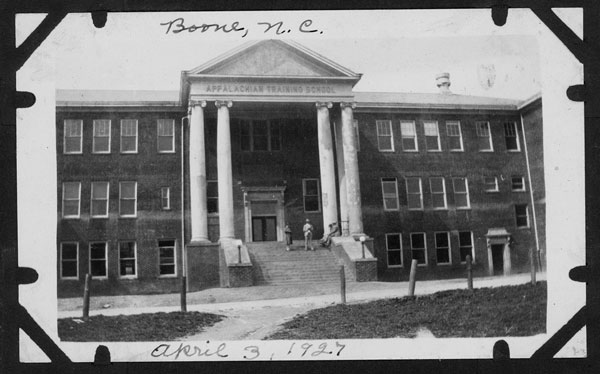
Boone Grade School is constructed as a Demonstration Elementary School, aka Appalachian Elementary School. The school was a cooperative institution between the university and Watauga County Schools, through which the school provided facilities and teachers for Watauga County students, and Appalachian Training School students gained teacher training in their final year. In 1954, a second facility for the school was built beside the Boone Grade School building. Before the Boone Grade School was built in 1924, the school had previously been taught in the university’s Science Hall. The Appalachian Elementary School program ended in 1975.

Profits from New River Light and Power are set aside to be used as a loan fund for students. Currently, NRLP reserves approximately $650,000 each year for the general scholarship fund at App State, which supports the Chancellor’s Scholarship and other university scholarships.
Appalachian State Normal School is accredited by the American Association of Teachers’ Colleges and Normal Schools.
The first organized football team begins intercollegiate sports competition in the 1928–29 school year.
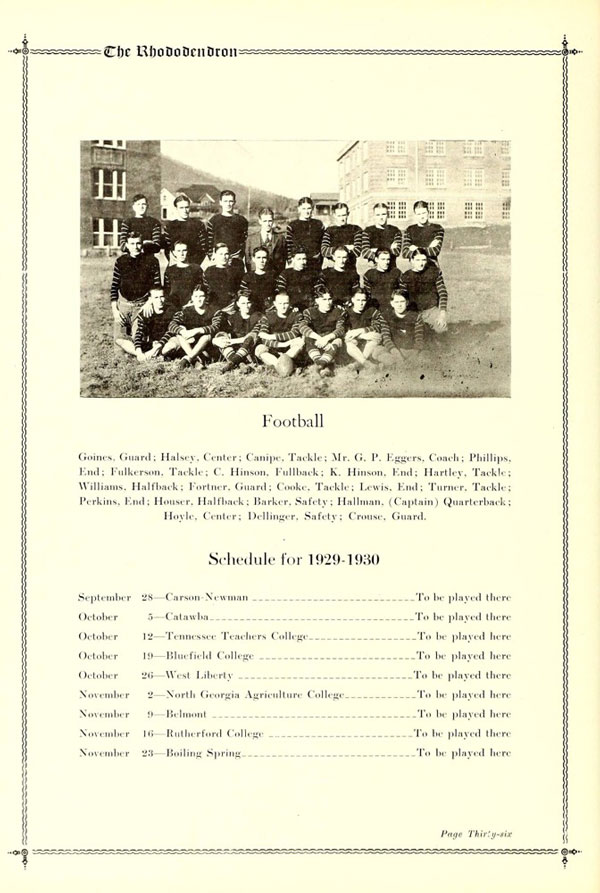
With approval from the state legislature, Appalachian State Normal School becomes the Appalachian State Teachers College — a four-year college for training teachers. B.B. Dougherty is named president of the college and a new Board of Trustees is formed.
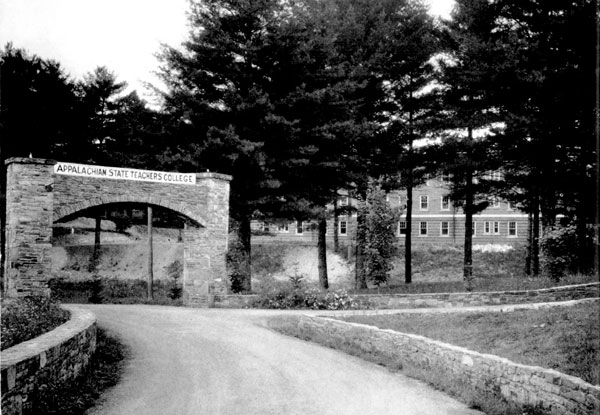
App State co-founder D.D. Dougherty passes away the same day that registration opened at the new Appalachian State Teachers College on June 10. After her husband’s death, Lillie Shull Dougherty took over as the college’s treasurer and business manager.
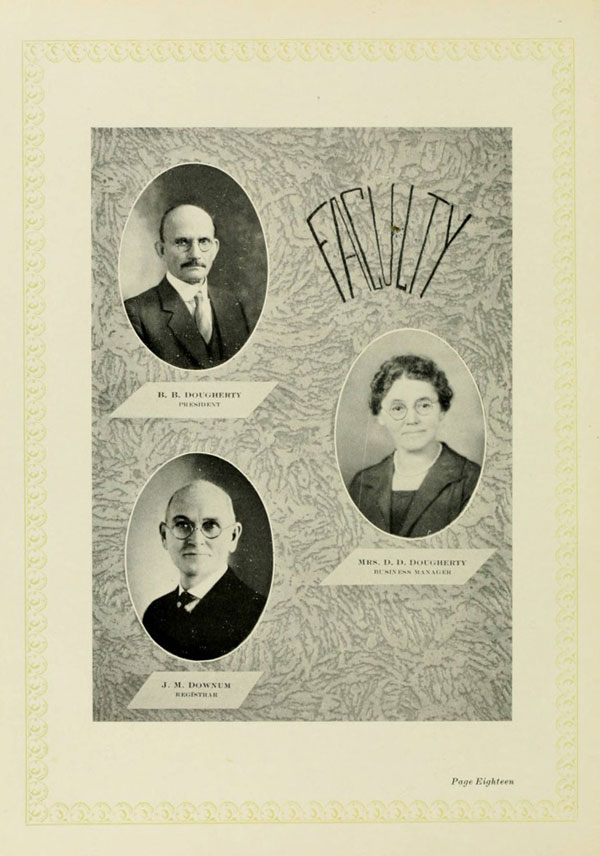
Timeline years 1930 to 2025 can be found here.
On Sept. 17, 2024, in the Senate Chamber, U.S. Sen. Ted Budd — an App State Class of 1994 alumnus — read a proclamation honoring Appalachian State University on its 125 years of service to the state and the Western North Carolina region. This proclamation is now part of the Congressional Record. Read the proclamation in full below.
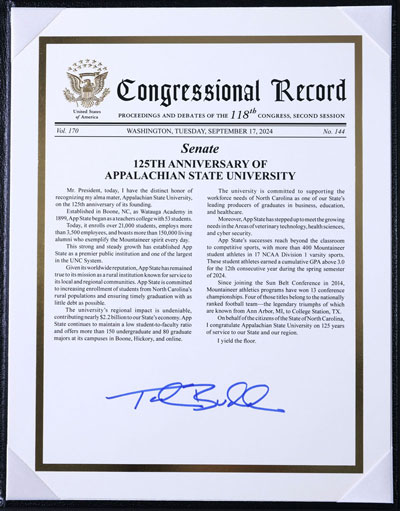
Mr. President, today, I have the distinct honor of recognizing my alma mater, Appalachian State University, on the 125th anniversary of its founding.
Established in Boone, NC, as Watauga Academy in 1899, App State began as a teachers college with 53 students.
Today, it enrolls over 21,000 students, employs more than 3,500 employees, and boasts more than 150,000 living alumni who exemplify the Mountaineer spirit every day.
This strong and steady growth has established App State as a premier public institution and one of the largest in the UNC System.
Given its worldwide reputation, App State has remained true to its mission as a rural institution known for service to its local and regional communities. App State is committed to increasing enrollment of students from North Carolina's rural populations and ensuring timely graduation with as little debt as possible.
The university’s regional impact is undeniable, contributing nearly $2.2 billion to our State's economy. App State continues to maintain a low student-to-faculty ratio and offers more than 150 undergraduate and 80 graduate majors at its campuses in Boone, Hickory, and online.
The university is committed to supporting the workforce needs of North Carolina as one of our State’s leading producers of graduates in business, education, and healthcare.
Moreover, App State has stepped up to meet the growing needs in the areas of veterinary technology, health sciences, and cyber security.
App State’s successes reach beyond the classroom to competitive sports, with more than 400 Mountaineer student athletes in 17 NCAA Division 1 varsity sports. These student athletes earned a cumulative GPA above 3.0 for the 12th consecutive year during the spring semester of 2024.
Since joining the Sun Belt Conference in 2014, Mountaineer athletics programs have won 13 conference championships. Four of those titles belong to the nationally ranked football team--the legendary triumphs of which are known from Ann Arbor, MI, to College Station, TX.
On behalf of the citizens of the State of North Carolina, I congratulate Appalachian State University on 125 years of service to our State and our region.
I yield the floor.
Open to anyone with an interest in the history of App State, University Archives houses not only the official records gathered from offices and departments but also the papers of individuals and organizations that are part of the university’s history.
Appalachian State University's History pages are a project of the University Communications team, with special acknowledgement for work by Jessica Stump, Derek Wycoff and the staff of University Archives.